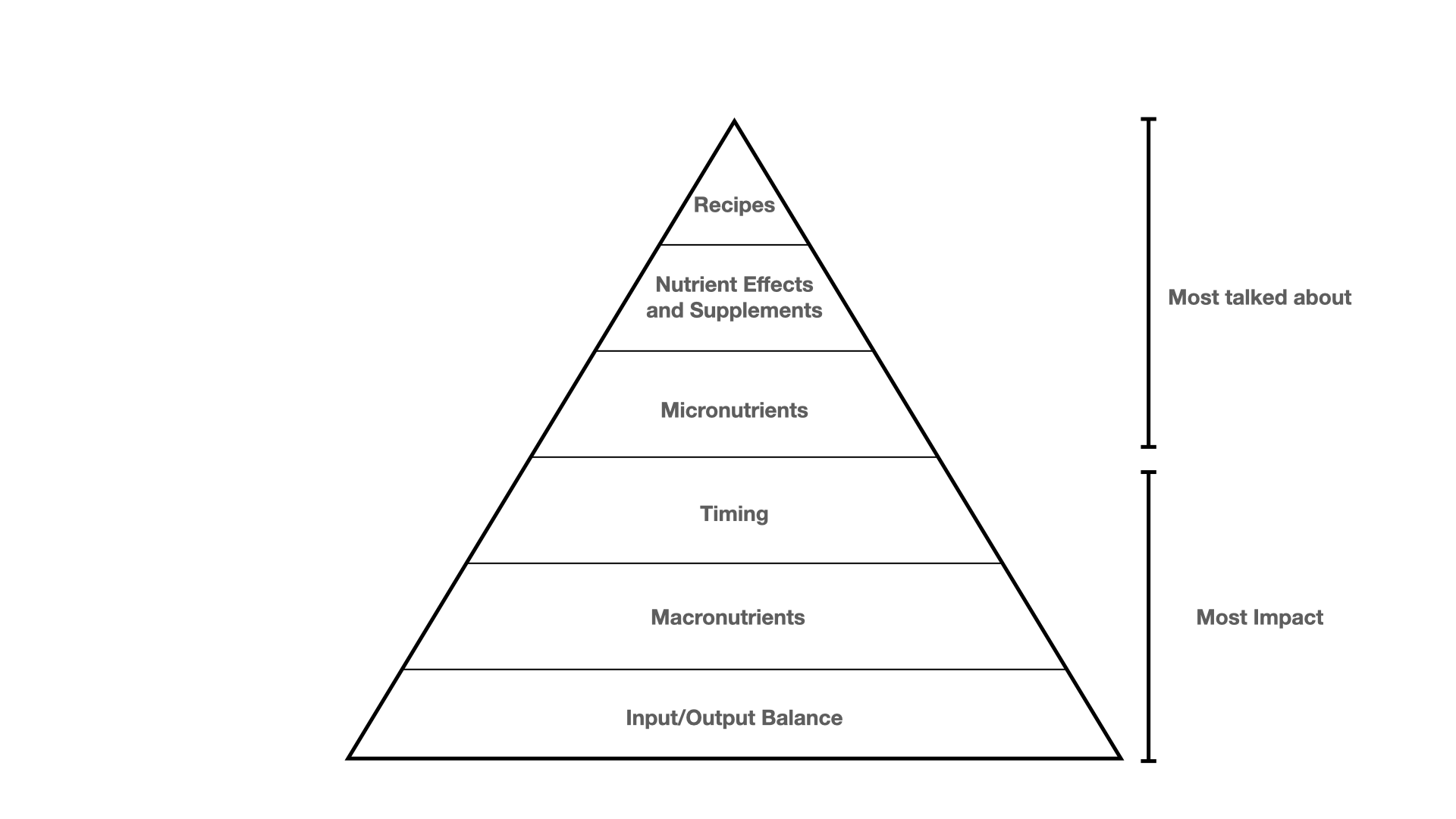Why nutrfy
The nutrition landscape is notoriously difficult to navigate, especially for athletes. There are tons of ideas and opinions out there, they often contradict each other, and advice is not always labelled for whom it is intended or useful.
I always imagine the concepts around nutrition as a pyramid that looks like this:

At the bottom, there are things I call the "Foundation" because they are the basic principles of nutrition: How what you eat compares to how much you spend, if you're eating carbs, protein, or fat, and when you eat (and when the energy from the food will be available to your body to use it).
And then, there's the middle area that concerns itself with important concepts as micronutrients like vitamines, electrolytes, and similar things that are important for the functions of our body (but normally available in sufficient quantities without any special precaution). Specific effects of nutrients other than providing fuel are also in this area (like what Omega-3 fat will do for your brain).
Finally, there's the very peak of the pyramid, consisting of recipes for "healthy eating", "clean eating" and other concepts.
Most of the advice you'll find online is in the upper part of the pyramid. Most of all, you will get tons of recipes for food you should eat as an athlete. But this will not help you much if you don't have the base of that pyramid right. What good is changing your own pancake recipe with a protein pancake thing, if your timing isn't right and you're eating it at the wrong time, or if you try to recover after a long endurance ride and what you really need are starchy carbohydrates to refill your glycogen stores quickly so you can go hard again tomorrow?
The same goes for super interesting insights into what type of nutritient can trigger which benefits you never knew were triggered by the food you eat. But again - what good is the advanced fatburning capability of L-Carnitine if your macronutrient mix is off and you're not eating enough protein to support muscle recovery?
Following very advanced nutrition advice without getting the basics right is a bit like following that training plans developed for World Tour riders and Olympians - sure, it sounds nice and important, but it's completely unsuited for your needs.
Nutrfy aims at helping you getting the basics right: Input/Output Balance, Macronutrient composition of your meals, and timing.
If you have those three things locked in (and with the help of nutrfy on autopilot), you will not only reap already most of the benefits planned nutrition can bring you, it will also open up more areas of nutrition for you to explore. That tasty protein pancakes? Nutrfy can tell you when it's a good time to have them, and how much of them you should eat.
Focus on the foundation
Nutrfy focuses on three things: Energy Balance, Macronutrients and Nutrition Timing:
Input/Output Balance
All other concerns set aside, there is one basic principle of weight management: If you want to lose weight, you need to eat less than you expend. If you want to gain weight (muscle mass and/or fat mass) you have to eat more than you expend. If you want to keep your weight the same, what you eat should match what you use.
Nutrfy calculates your expected output and gives you a target number for your daily calorie intake. Depending on your training schedule and goals, these target numbers will be different for each day.
Macronutrients
Now that you know how much to eat, the next question is: What? To make sure that you're properly fuelled, you have to eat (lots of) carbohydrates. Protein will help your body repair damaged muscle, and fat is an important part of any diet. Nutrfy will match your recipes to a desired macronutrient mix so you don't have to do the math in your head (which is suprisingly hard).
Timing
If the whole idea of food is to provide enough fuel for your training sessions and all other demands of life, the next logical question is: When should I eat so that the energy from the food is available when I eat it? It wouldn't make much sense to consume a carbohydrate-heavy meal designed to provide energy to your engine after your high-intensity workout session, right?
A useful concept for nutrition timing is thinking in "feeding windows" around workouts. Stocking up on energy before the workout, and replenishing and repairing after the workout need to consider a certain timeline.
Nutrfy suggests good feeding opportunities according to your scheduled workouts, combining it with some common sense revolving around the idea that you're likely not training full time, and have certain limitations to your schedule.